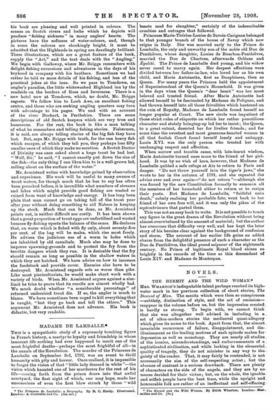MADAME DE LAMBALLE.*
THIS is a sympathetic study of a supremely touching figure in French-history, a martyr to loyalty and friendship in whose innocent life nothing had ever happened to merit one of the most frightful deaths—perhaps the most frightful of all—in the annals of the Revolution. The murder of the Princesse de Lamballe on September 3rd, 1792, was an event to thrill humanity with pity and horror. Once realised, it is impossible to forget the vision of that "little lady dressed in white "—the vision which haunted one of her murderers for the rest of his life—coming forth from the prison doors into that awful courtyard, the first sight of which, one may hope, made her unconscious of even the first blow struck by those " wild • The Princes do ',timbal's: a Biography. By B. C. Hardy. Illustrated. London: A. Constable and Co. 112s. not.]
beasts mad for slaughter," certainly of the indescribable cruelties and outrages that followed.
Princesse Marie-Therese-Louise de Savoie-Carignan belonged to that younger branch of the house of Savoy which now reigns in Italy. She was married early to the Prince de Lamballe, the only and unworthy son of the noble old Duct de Penthievre, whose daughter, Louise de Bourbon-Penthievre, married the Duo de Chartres, afterwards Orleans and RgaZile. The Prince de Lamballe died young, and his widow never cared to marry again. Her deepest affections were divided between her father-in-law, who loved her as his own child, and Marie Antoinette, first as Danphiness, then as Queen. For many years the Princess held the appointment of Superintendent of the Queen's Household. It was given in the days when the Queen's "dear heart" was her most beloved and trusted friend. After Marie Antoinette had allowed herself to be fascinated by Madame de Polignac, and had thrown herself into all those frivolities which hastened on the ruin of Royalty, Madame de Lamballe found herself no. longer popular at Court. The new circle was impatient of those strict rules of etiquette on which her rather punctilious character and stately bringing-up led her to insist; the Queen, to a great extent, deserted her for livelier friends ; and for some time the sweetest and most generous-hearted woman hi- en that foolish Court found herself lonely and unhappy. Louis XVI. was the only person who treated her with unchanging respect and affection.
When sorrow and trouble came, with late-learnt wisdom, Marie Antoinette turned once more to the friend of her girl- hood. It was by no wish of hers, however, that Madame de Lamballe quitted a safe refuge at Aix to return to Paris and danger. "Do not throw yourself into the tiger's jaws," she wrote to her in the autumn of 1791, and she repeated the advice over and over again—" do not return "—although she was forced by the new Constitution formally to summon all the members of her household either to return or to resign their posts. But Madame de Lamballe, "faithful unto death," calmly realising her probable fate, went back to her friend of her own free will, and it was only the pikes of the septembriseurs that parted them.
This was not an easy book to write. It is not possible to touch any figure in the great drama of the Revolution without being almost overwhelmed by the amount of material ; but the author has overcome that difficulty very well, and has kept the later story of his heroine clear against the background of confusion and storm. The account of her earlier life gains an added charm from the delightful presence of such a character as the Duo de Penthievre, the ideal grand seigneur of the eighteenth century. No Prince of legitimate Royal blood shines so brightly in the records of the time as this descendant of Louis XIV. and Madame de Montespan.


















































 Previous page
Previous page